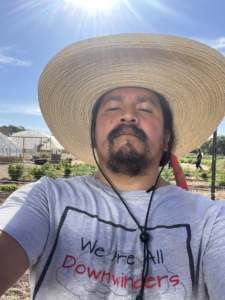
Travis McKenzie
Travis McKenzie, a middle school teacher in Bernalillo County, is a strong proponent of culturally relevant education. As a lifelong student himself, McKenzie’s route to NMHU was a winding one filled with the pursuit of hands-on learning.
“I went into the college of education but got burnout with Western civilization classes,” McKenzie said. “I was doing hours of reading to go to class and talk for five minutes.”
McKenzie’s frustration led him to build his own degree and he focused on alternative education through sustainable agriculture. He soon became involved with the Southwest Organizing Project in Albuquerque where he helped create Project Feed the Hood, a Food Justice Initiative and community garden.
“That led me into doing food justice work. Project Feed the Hood empowers people to create social justice and social change in their community,” McKenzie said. “It got me invited into a lot of school garden spaces, doing tours, and working with different nonprofits including the New Mexico Acequia Association.”
Beginning in 2009, McKenzie worked in food justice with nonprofit organizations. In 2017, he was invited by a middle school principal to create a garden elective at the school. And although he initially pursued getting his teaching license elsewhere, he jumped ship when he found NMHU.
“Highlands was a beacon of light. I love the Norteño feel,” McKenzie said. “Dr. Kappus is a hero; without her I would probably not being teaching. And I got to have an incredible mentor in Señor Lopez, and we had a great cohort. All my professors were extremely compassionate and offered great coursework. The program just wants to get good people teaching and working with our young people and families.”
When the pandemic hit, McKenzie’s principal cut his garden program. He was disappointed but the assistant principal of Polk Middle School in the South Valley reached out to him to bring him on board.
“I ended up falling in love with their principal, Ben Bustos. He’s an old-school Chicano from Mora who understands agriculture and the Chicano Movement,” McKenzie said. “This will be my fourth year teaching there. I’m a social studies teacher, the school’s garden resource teacher, and I also do restorative justice.”
Among many other projects, McKenzie is working to make the garden at Polk Middle School ADA accessible, to create spaces in the hoop houses for year-round outdoor learning, and to produce enough vegetables from the garden to supply a veggie bar in the cafeteria. He sees the loss of classes like shop and home economics as an opportunity to reintroduce life skills in culturally responsive ways.
“Hopefully, New Mexico can be a part of a renaissance of bringing the fine arts to life, and agriculture, and STEAM, and environmental education,” McKenzie said. “In everything that I do, I try to weave in social justice lens and perspective and give our young people opportunities to help address the challenges they face and be a part of creating solutions. Instead of teaching at our youth, I think the future of education is teaching with them and looking at curriculum as a shared practice and creation.”
